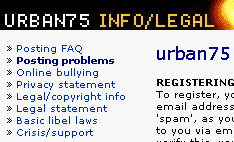|
|
 Coping with web success (part 1)
Coping with web success (part 1)
A popular site can come at a heavy price
By Mike Slocombe for Internet Magazine, May 2004
If you've been faithfully following our lovingly created tutorials, you should now be the proud owner of a well crafted sex kitten of a site that creates an irresistible attraction to passing search engine robots.
With your keyword-optimised pages luring inquisitive robots into every nook and cranny, there's a good chance that your site will start soaring up the search engine rankings.
And a high ranking will raise your site's profile and potentially send a tidal wave of surfers your way - and if they like what they see, they'll tell their friends. Lots of them!
Before you know it, sleepy pages previously only troubled by the occasional cyber-rambler will be trampled underfoot by stampeding herds of content-guzzling surfers.

Slumbering bulletin boards barely troubled with a post will be bum-rushed by hyperactive, gibbering mobs while your chatroom will resonate to the sound of a thousand keystrokes.
Around the clock, 24/7, bandwidth-gorging surfers will be running wild through your site, clicking on anything that can be looked at, played with, listened to, downloaded or streamed. Your site has become the talk of the internet!
But with the pleasure of success comes the pain of bandwidth excess. Each visitor to your site will be chewing up more of your precious bandwidth allowance, with your host demanding excess charges of near-biblical proportions.
Running a busy site will also eat into your spare time, so make sure you can commit enough resources before unleashing your killer site on the world!

Managing a busy bulletin board
Like a tantrum-throwing two year old, a successful bulletin board demands constant attention. Turn your back for a minute and all hell may break loose, so you'll need to elect moderators to help ward off trollsters, scammers, spammers and abusive nutcases.
 A busy site can attract disruptive posters from all over the world, so enlist an insomniac moderator (or one living in a different time zone) to prevent nocturnal mischief.
A busy site can attract disruptive posters from all over the world, so enlist an insomniac moderator (or one living in a different time zone) to prevent nocturnal mischief.
Although basic, free hosted bulletin boards like bravenet.com are fine for mellow musings, if things heat up you'll soon be facing crippling post restrictions or hit with chunky fines for exceeding bandwidth limits.
To administrate and maintain a thriving community you'll need to run robust bulletin board software and make sure that your server is up to the job.
Some of the most popular boards run on the excellent PHP-driven vbulletin board software and the freeware phpBB
Also check out the Perl-driven Ultimate Bulletin Boards and the free ASP-powered Snitz Forums.

Bandwidth explained.
The term bandwidth is usually used to describe the total amount of files and data transferred from your server every month.
Technically, this isn't correct because bandwidth really refers to the amount of data transferred in any given second.
Both figures are important though, and how much you get of each will depend on your hosting package.
The bandwidth offered by a hosting company depends on the capacity of its connection to the internet.
If your server has a 2Mbps leased line, for example, then it can only cope with 2MB of traffic at any given point and some visitors may not get served during busy periods.
Remember that if your site sits on a shared server, other sites will be eating into the total available bandwidth too.
The amount of data that can ber transferred from your site will usually be restricted by your host.
The amount you'll use can be calculated fairly easily - if the elements of your homepage (HTML page, graphics, style sheets etc) add up to 50k, then every time someone accesses that page, it'll burn up 50k of your bandwidth allowance.
So if a 100 people access your home page every day, you'd use up 5 meg's worth of your bandwidth allowance (100 people x 50k). Multiple that by 30 days and you'll get a monthly total of 150 Meg/month.
It's not so easy to estimate bandwidth on large, complex sites, but this simple formula can help you get a ballpark figure:
Average Daily Visitors x Average Page Views x Average Page Size x 31

If you're hosting your site on the free space that came with your dial up account, you can expect a relatively miniscule allowance (e.g Demon Internet only allows 150 Mbytes/day) while most web hosts offer a sliding scale of charges linked to bandwidth requirements. Be wary of deals offering 'unlimited bandwidth' as they often come with a crate load of caveats.
It's important to secure a hosting deal that meets your bandwidth requirements as the punishment can be swift and punitive if you exceed their limits. Some hosts will instantly suspend your site while others will levy wallet-lightening surcharges.
Calculating bandwidth:
www.findmyhosting.com/

Finding a web host
It's a fat lot of good putting together a fabulous site if the server keeps crashing or page delivery grinds to a crawl. A busy site demands a robust, reliable server, so take time to research a suitable host and monitor their performance here: http://news.netcraft.com/
Remember, you don't have to host your site in the UK so check out these sites for some ratings, advice and good deals:
http://uk.tophosts.com/
www.hostapproval.com/
www.hostinghelp.com/
http://wdvl.internet.com/
www.web-hosting-reviews.org/

FAQ-ing questions
If your site takes off you'll suddenly find people asking you questions, almost all of them on the same subject ('Why did you start this site?', 'Can I use your photos on my site?', 'Can I advertise on your site?' etc).
 Save yourself a lot of bother by setting up email templates for the oft-repeated questions and include a comprehensive set of FAQs on your site, linked from every page. Save yourself a lot of bother by setting up email templates for the oft-repeated questions and include a comprehensive set of FAQs on your site, linked from every page.
Include a technical help section if your site uses Java, Flash or any kind of plug in.

Footing the bills
As your site grows in popularity, your bandwidth costs are going to climb higher than Sir Chris Bonnington on crack.
Unless you're lucky enough to cadge cash or free server space from a generous philanthropist, you're going to have to raise some funds to keep your site afloat.
 A popular way to generate income is to invite visitors to donate money using PayPal or NoChex accounts. For a small commission, these services can prove a useful source of revenue, so make sure that you liberally scatter 'donate now' links all over your site.
A popular way to generate income is to invite visitors to donate money using PayPal or NoChex accounts. For a small commission, these services can prove a useful source of revenue, so make sure that you liberally scatter 'donate now' links all over your site.
Regular monthly payments will make it easier to plan ahead so try and encourage your appreciative audience to set up standing orders with your bank.

You may want to consider banner adverts, although they won't return much dosh unless your site is very popular.
Be sure to take into account the potential negative impact they may have on your visitors - many surfers would rather sit naked in a bath of angry crabs than endure page after page of banner ads, pops-up, pops-belows and other ghastly advertising gimmicks.
A less intrusive option would be to get related companies to sponsor sections of the site - if you're cheeky enough you may get away with just a little logo in return for some much needed cash!
Server-sustaining funds can also be generated using affiliate programs like Amazon's, where you can earn referral fees from any sales generated via your site.

Merchandise
If you've built up a loyal following, flogging off a range of site-branded merchandise (t-shirts, mugs, calendars etc) can be a great way of earning a few quid. 'One-stop' merchandise sites like http://www.cafepress.com offer a no-fuss, automated e-commerce service for your site, but they're expensive.
 You'll make far more money doing it yourself, using local suppliers and services. But bear in mind that labelling, packing and mailing off 100 t-shirts can be a time consuming business!
You'll make far more money doing it yourself, using local suppliers and services. But bear in mind that labelling, packing and mailing off 100 t-shirts can be a time consuming business!
Making money from your website:
www.thesitewizard.com/

Case study: Hail to the Paypal.
A popular, non-profit Radiohead fan site, ateaseweb.com, found itself in trouble when the band's new album 'Hail To The Thief' was announced, sending an unprecedented flood of visitors to the site.
The owner, Adriaan Pels, found himself facing immense bills from his host which he couldn't cover. Faced with closure, he set up a PayPal account and asked his visitors to help out - and was amazed to find a flood of donations coming in, with XFM radio pitching in with a sponsored banner advert.
This provided the finances to move to a more expensive dedicated server, but the solution is only a short term one - donations have slowed down and if the site continues to grow, his bandwidth charges will escalate accordingly.
Next step: reducing bandwidth
« Back to tech homepage
|

